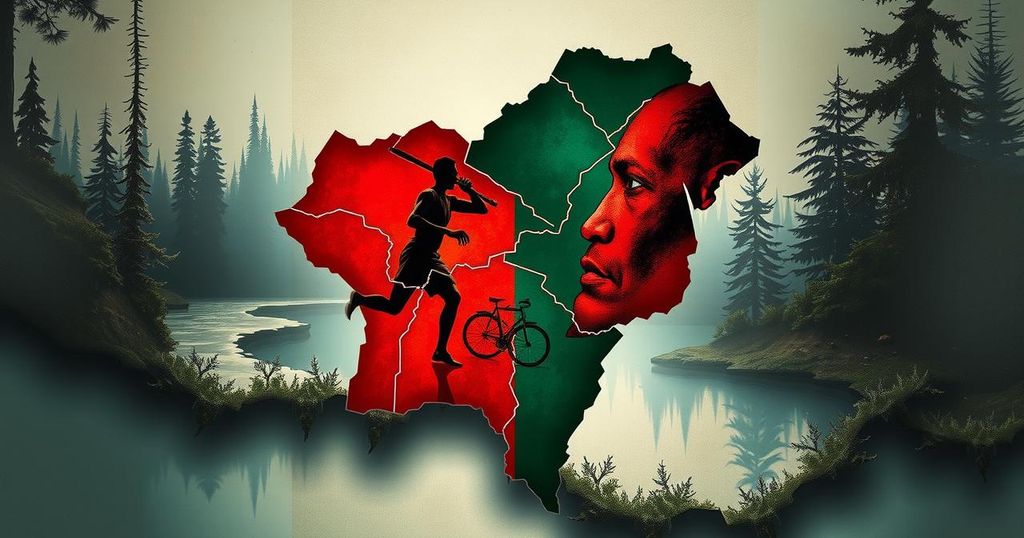The Displacement of Tutsis in the Democratic Republic of Congo

The M23 rebel group has claimed to fight for the protection of ethnic Tutsis in eastern DR Congo amid widespread persecution allegations. However, global authorities have imposed sanctions due to the group’s involvement in war crimes. The Tutsi population, numbering possibly in the hundreds of thousands, faces systemic discrimination. Historical ties to Rwanda aggravate their status, as ongoing violence highlights their struggle for national identity and belonging amid a backdrop of ethnic conflict.
The M23 rebel group currently exploits the vulnerabilities of eastern Democratic Republic of Congo by asserting that ethnic Tutsis face persecution. This ongoing conflict has forced numerous individuals to evacuate their homes and raises critical questions about the identity and inclusiveness of Congolese nationality. Despite the purported advocacy for Tutsis, the rebel group’s actions have led various global authorities, including the UN and US, to impose sanctions due to allegations of war crimes. Moreover, the complex historical ties between Tutsis and Rwanda complicate the situation, leading to political exploitation of the conflict over regional mineral wealth.
Estimates suggest that there are potentially hundreds of thousands of Tutsis residing in DR Congo, though no official figures are available. It is crucial to note that not all Tutsis support the M23’s actions. Nevertheless, countless reports indicate a pattern of systemic discrimination against Congolese Tutsis and the Banyamulenge, ranging from verbal abuse to violent ethnic attacks, propelled mainly by historical grievances about their connections to Rwanda.
An illustration of this tragic narrative is provided by Bukuru Muhizi, who recounts his family’s history of suffering due to their Tutsi and Banyamulenge identities in an environment where such affiliations can lead to lethal consequences. He indicated that members of his family had been murdered over multiple generations, attributing these acts to the Congolese armed forces. His alarming account points to a broader issue of violence that he claims constitutes a “silent genocide” against his community.
Discrimination against Tutsis can also manifest in other forms, such as unjust treatment based on physical appearance. Muragwa Cheez Bienvenue expressed an unsettling experience where, upon passing through airport security, he was targeted due to his resemblance to Rwandan leadership, which he perceived as a direct threat to his liberty. This underscores the pervasive atmosphere of hostility towards Tutsis, particularly during political unrest.
Historical context plays a significant role in understanding current identities. The division of the Rwandan monarchy territories during colonial rule laid the groundwork for future ethnic tensions, as the arbitrary drawing of borders detached communities linked through shared heritage. Subsequent waves of Tutsi migration into DR Congo, often fleeing violence, have contributed to demographic changes that foster resentment and distrust among local populations.
Political dynamics surrounding the Tutsis in DR Congo have fluctuated; while citizenship was granted in the early 1970s, subsequent regressive policies have rendered numerous individuals stateless. Historical accounts reveal grievous attacks against Tutsi communities, particularly in the context of military operations supported by the state. Though the current constitution recognizes Tutsi and Banyamulenge groups as Congolese, discrimination persists, influencing their social and political standing.
Notably, contemporary reports illustrate that tensions among ethnic groups often escalate during periods of conflict, leading to a reinforcement of stereotypes and continued violence against Tutsis. Experts assert that sentiments of distrust towards Tutsis surge amid M23 uprisings, complicating their efforts to gain acceptance as legitimate members of society. Even those Tutsis who support the struggle for recognition feel the weight of representation that might paint their community as antagonistic.
While President Félix Tshisekedi has acknowledged the need to confront discrimination against Tutsis, including condemning hate speech, governmental narratives often diminish the severity of ethnic tensions. The spokesperson for the government emphasized the communal conflicts prevalent among multiple ethnicities in DR Congo, attempting to frame the issues within a broader context rather than focusing on the distinctive plight of the Tutsi population. Nevertheless, individuals from the Banyamulenge community, like Mr. Bienvenue, fiercely contest this narrative by sharing personal testimonies of enduring discrimination in their own homeland.
The plight of Tutsis in the Democratic Republic of Congo emphasizes the intricate interplay between ethnicity, historical context, and political dynamics. Widespread discrimination and violence against these communities persist, despite constitutional recognition and the acknowledgment of their contributions to national governance. As the violence escalates due to the M23 conflict, the challenges faced by Tutsis serve as a stark reminder of the urgent need for sustained efforts toward inclusion and protection in Congolese society.
Original Source: www.bbc.com








